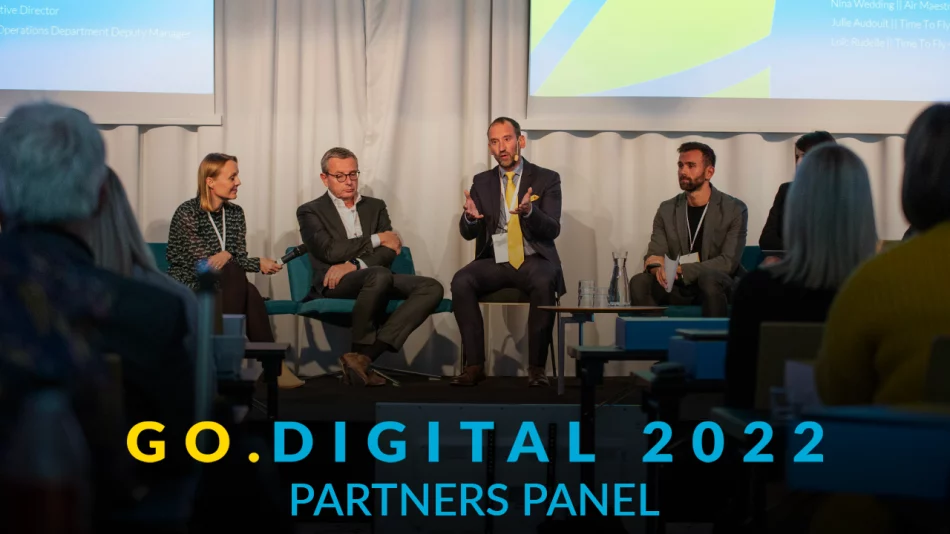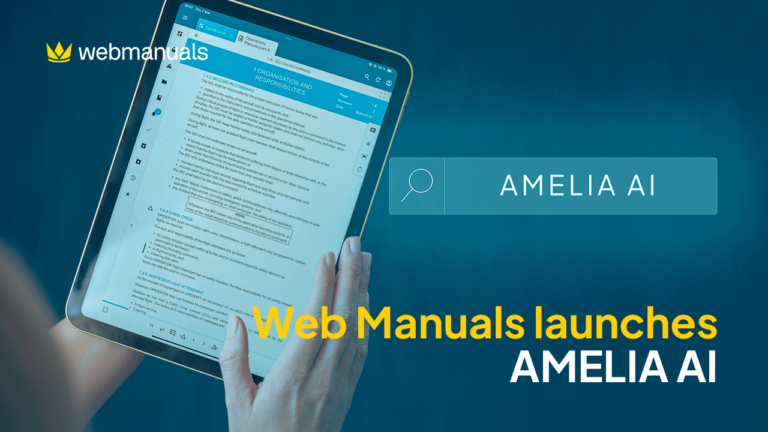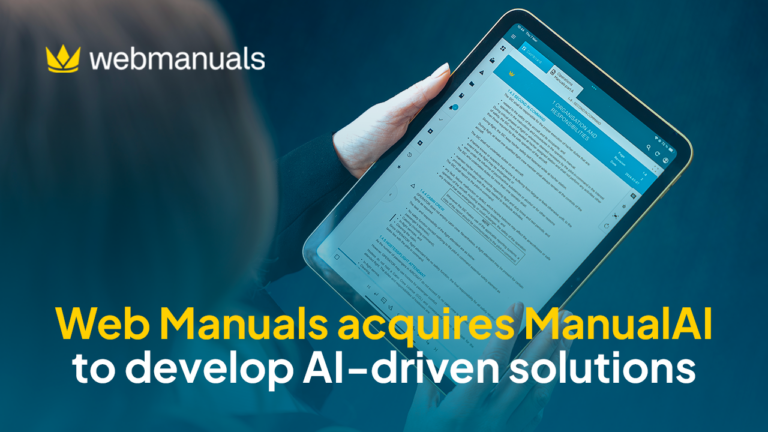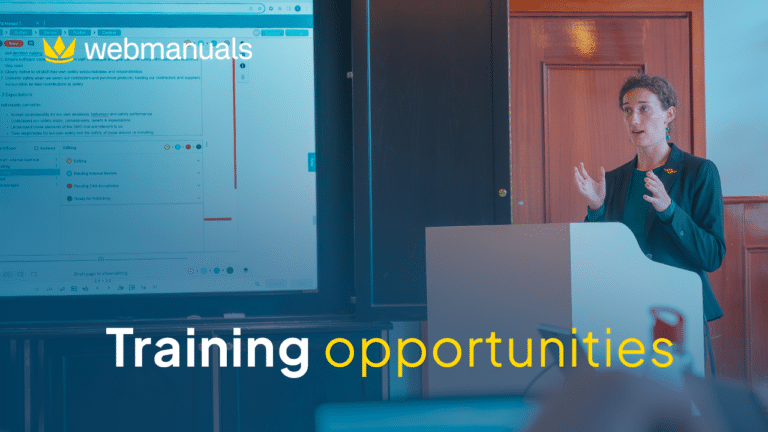One of the main goals at Go Digital is to analyze and share relevant insights that help the community’s future development. For this year’s Partners Panel, we gathered aviation experts to discuss and consider future scenarios in the aviation industry.
Led by Damien Remond, our Partner Executive and moderator, we framed the debate within the multiple challenges and global crises we have faced in recent years. This group of partners shared their experiences and points of view on diverse approaches to successfully adapt to the upcoming changes and unpredictable future.
We had the privilege to hear interesting perspectives from Jonathan Frey, Director of Sales America at ASQS; Julie Audouit, Executive Director, and Loic Rudelle, from the Flight Operations department at Time to Fly; Mark Overeijnder, owner of MarQonform; Aleks Banas, CEO, and Nina Wedding, Customer Support Manager, at Air Maestro.
Tackling challenges as opportunities
Moderator: We are all engaged in easing our customers’ daily operations, providing tools, and supporting them to fly safely. Considering the latest happenings in the world, should operators be prepared for more dramatic changes? And how to turn these challenges into successful experiences?
Time to Fly: The business transformation to other operations, for example, and the constant release of new regulations was a significant challenge for flight operators. We noticed that having tools for document management was a critical asset for facilitating quick adaptation to these circumstances. We can say that having a system that keeps documentation up to date was a game-changer advantage.
Safety and compliance are not the only big topics in the future. We see for the upcoming future challenges in sustainable aviation and emerging technologies, and we need to take that direction and stay ahead of those challenges.
ASQS: We need to be prepared to act for unexpected emergencies with systems that can ease the way of facing a problem. We need to have stable systems in place and adjust our organizational cultures within the industry to allow more information sharing. The path to being more resilient depends a lot on the partners you have, and that’s one of the biggest importance of conferences like this to boost information-sharing culture. Sharing best practices, and incident data is part of that in an environment that encourages the prevention of similar things in the future.
Air Maestro: For us, agility is one of our core values and during the past crises, we had to put that into practice by presenting alternatives that could support customers in critical circumstances. In our case, we hold the expansion to new markets and re-direct our business model. We noticed the paramedical sector blossoming and jumped into it to assist with their requirements. Now those features created for them, are being used outside the paramedical sector. The software development we did during the time of crisis was very effective in supplying the need of new customers.
MarQonform: We have a wonderful system that helps get us compliant, and we need to work together to put the work into practice as described in the manuals.
Collaboration in the center
Moderator: We, at Web Manuals, believe in the importance of building and sharing knowledge within the community. For this, we need the support of our partners to find and develop new features in order to prepare for the future. Do you agree on the relevance of partnership and collaboration?
Time to fly: Collaboration is key for the future. With the new regulations in place after Covid, we want to participate actively and not wait until the last minute to be compliant. That is how we can anticipate these new regulations. Flexibility in terms of activity is another key element because we need to develop new activities and think out of the box. For example, we created the carbon assessment and the drone activities support to respond to the Covid crisis.
ASQS: A lot of our development is regulatory-driven, so we are still reacting to what authorities are telling us to do instead of taking a proactive approach to it. We need to take the time to think about what we want to change, and how we want to play our role in advancing the industry. Our mission is to advance in digitalization, and after 2 years of the pandemic, I still don’t think we are fully digitized, but it’s a way of going forward. I think it is very important to shift the mentality from reacting to regulatory requirements to thinking about why these are in place and what we can do to improve them further to get ahead of the curve.
What would be the next challenge?

Air Maestro: For us, sustainable aviation. We can anticipate it, especially in France it is a relevant topic now.
ASQS: I believe it will be around advancements in technology in general. That also implies threats to private security. The main point here is that if you see a challenge on the horizon, be prepared to avoid it becoming a threat and proactively answer to it.
Is AI a threat or an opportunity?
Time to fly: I think it’s an opportunity, and we are exploring its capabilities. For us, it’s an exciting scenario.
MarQonform: I see it as a threat. Out of experience, I noticed that the aviation industry is rather conservative, so we are dealing with a lot of conservative systems and authorities. I wonder how we are coping with those new systems and developments. In addition, you need competent people to deal with it, which is also a threat because where will we get these competent people from? And how do we teach them? With conservative videos or video tutorials?
Moderator: We should focus on agility, on how to react proactively to the changes, and how to integrate its opportunities into our systems.
Time to Fly: I see it as an opportunity for consultant companies like us. We can see spaces that are not so interesting that can be managed by AI. Even for audits, we could use it for preparing the documentation and making the reports. Using it can improve and make our process more efficient.
ASQS: We see it as a tool, not a decision-maker. It is very important that in the end, after gathering all the information, it should be presented in an easy and understandable way to make a clear decision. There must be a person in the end who makes the final decision. Advanced technology can help there as a tool to make life easier, but not to replace the competent person.
Web Manuals: We need to look ahead to the development and impact of autonomous and electronic aviation. This represents a risk at a competitive level. I would consider that all operators will be severely impacted by the electrification of aviation in the upcoming 5 to 10 years. And it’s going to be a fundamental shift. Some companies will be successful at using this to their advantage, either by transitioning to the technology that is expensive to maintain and repair. Some will be disruptive and struggle to continue in the current way of working. Electrification of these different modes of flights will be a massive disruption over the coming years, so it is necessary to consider “what happens to my business when there are suddenly drone operators coming in and offering compatible but cheaper, faster, more scalable businesses?”. Or “what happens to my paramedical operation when a competitor is introducing eVTOL aircraft that can operate at a completely different level of costs.” Also, looking from airports and maintenance side, where the introduction of electricity has a necessary component for shortening times; what happens to engines when the variation in complexity compared to the jet engine; and so on.




